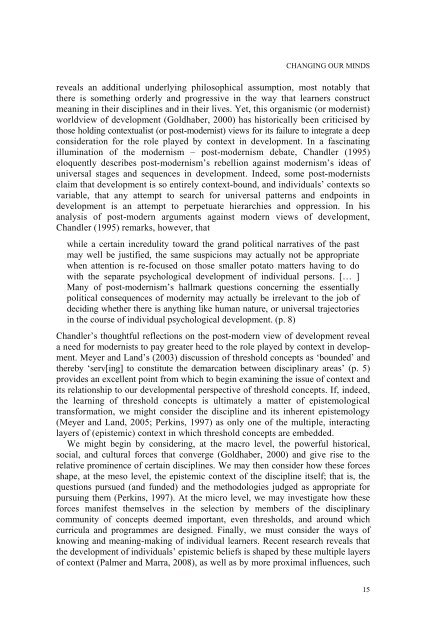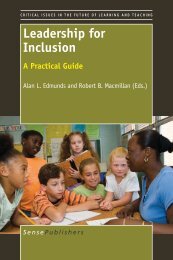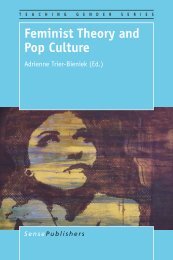CHANGING OUR MINDSreveals an additional underlying philosophical assumption, most notably thatthere is something orderly <strong>and</strong> progressive in the way that learners constructmeaning in their disciplines <strong>and</strong> in their lives. Yet, this organismic (or modernist)worldview of development (Goldhaber, 2000) has historically been criticised bythose holding contextualist (or post-modernist) views for its failure to integrate a deepconsideration for the role played by context in development. In a fascinatingillumination of the modernism – post-modernism debate, Ch<strong>and</strong>ler (1995)eloquently describes post-modernism’s rebellion against modernism’s ideas ofuniversal stages <strong>and</strong> sequences in development. Indeed, some post-modernistsclaim that development is so entirely context-bound, <strong>and</strong> individuals’ contexts sovariable, that any attempt to search for universal patterns <strong>and</strong> endpoints indevelopment is an attempt to perpetuate hierarchies <strong>and</strong> oppression. In hisanalysis of post-modern arguments against modern views of development,Ch<strong>and</strong>ler (1995) remarks, however, thatwhile a certain incredulity toward the gr<strong>and</strong> political narratives of the pastmay well be justified, the same suspicions may actually not be appropriatewhen attention is re-focused on those smaller potato matters having to dowith the separate psychological development of individual persons. [… ]Many of post-modernism’s hallmark questions concerning the essentiallypolitical consequences of modernity may actually be irrelevant to the job ofdeciding whether there is anything like human nature, or universal trajectoriesin the course of individual psychological development. (p. 8)Ch<strong>and</strong>ler’s thoughtful reflections on the post-modern view of development reveala need for modernists to pay greater heed to the role played by context in development.Meyer <strong>and</strong> L<strong>and</strong>’s (2003) discussion of <strong>threshold</strong> <strong>concepts</strong> as ‘bounded’ <strong>and</strong>thereby ‘serv[ing] to constitute the demarcation between disciplinary areas’ (p. 5)provides an excellent point from which to begin examining the issue of context <strong>and</strong>its relationship to our developmental perspective of <strong>threshold</strong> <strong>concepts</strong>. If, indeed,the <strong>learning</strong> of <strong>threshold</strong> <strong>concepts</strong> is ultimately a matter of epistemologicaltransformation, we might consider the discipline <strong>and</strong> its inherent epistemology(Meyer <strong>and</strong> L<strong>and</strong>, 2005; Perkins, 1997) as only one of the multiple, interactinglayers of (epistemic) context in which <strong>threshold</strong> <strong>concepts</strong> are embedded.We might begin by considering, at the macro level, the powerful historical,social, <strong>and</strong> cultural forces that converge (Goldhaber, 2000) <strong>and</strong> give rise to therelative prominence of certain disciplines. We may then consider how these forcesshape, at the meso level, the epistemic context of the discipline itself; that is, thequestions pursued (<strong>and</strong> funded) <strong>and</strong> the methodologies judged as appropriate forpursuing them (Perkins, 1997). At the micro level, we may investigate how theseforces manifest themselves in the selection by members of the disciplinarycommunity of <strong>concepts</strong> deemed important, even <strong>threshold</strong>s, <strong>and</strong> around whichcurricula <strong>and</strong> programmes are designed. Finally, we must consider the ways ofknowing <strong>and</strong> meaning-making of individual learners. Recent research reveals thatthe development of individuals’ epistemic beliefs is shaped by these multiple layersof context (Palmer <strong>and</strong> Marra, 2008), as well as by more proximal influences, such15
TIMMERMANSas religion <strong>and</strong> family (Gottlieb, 2007). We must therefore be prepared to acceptvariation in learners’ cognitive <strong>and</strong> affective responses to our attempts to ‘teach’<strong>threshold</strong> <strong>concepts</strong>.The value of an approach that acknowledges the existence <strong>and</strong> influence of themultiple layers of interacting (epistemological) contexts in which <strong>threshold</strong> <strong>concepts</strong>are embedded allows us, in Kegan’s terms, to make them ‘object’. Consequently,rather than being impervious to their influence, we may hold them to light,examine them, <strong>and</strong> question their influence in shaping our current <strong>and</strong> future waysof knowing <strong>and</strong> being.CONCLUDING THOUGHTSWith increased calls for accountability <strong>and</strong> the requirements of professionalaccreditation organisations, we must necessarily be concerned with, <strong>and</strong> attend to,the outcomes of <strong>learning</strong> in higher education. Indeed, we must have a clear visionof the direction in which we would like to take students. The questions raised inthis chapter caution us, however, against making the acquisition of <strong>threshold</strong> <strong>concepts</strong>our sole focus as educators. We are perhaps reminded that increased attention tothe <strong>learning</strong> process might help ensure that learners achieve the intended outcomesin a manner that recognises <strong>and</strong> respects the great cognitive <strong>and</strong> affective workthey must do. Designing such developmentally-appropriate instruction involveshaving a deep underst<strong>and</strong>ing of learners’ current ways of making meaning, forwhat we are facilitating is a process of epistemological transformation so crucial tolearners’ ‘becoming’: becoming disciplinary experts, <strong>and</strong> perhaps, most importantly,becoming more fully themselves.ACKNOWLEDGEMENTSThis research is partially supported by generous grants from the Social Sciences<strong>and</strong> Humanities Research Council of Canada (SSHRC) <strong>and</strong> the Fonds québecoisde la recherche sur la société et la culture (FQRSC). I would also like to thankDrs. Cynthia Weston, Alenoush Saroyan, <strong>and</strong> Krista Muis for their thoughtfulresponses to my Comprehensive Examination Paper – the document in which theideas for this chapter originated.REFERENCESAnderson, L. W., & Krathwohl, D. (Eds.). (2001). A taxonomy for <strong>learning</strong>, teaching, <strong>and</strong> assessing:A revision of Bloom’s taxonomy of educational objectives. New York: Longman.Atherton, J. S. (2008). Doceo: Learning as loss 1 [On-line] UK. Retrieved from http://www.doceo.co.uk/original/learnloss_1.htmBaltas, A. (2007). Background ‘assumptions’ <strong>and</strong> the grammar of conceptual change: Rescuing Kuhnby means of Wittgenstein. In S. Vosniadou, A. Baltas, & X. Vamvakoussi (Eds.), Reframing theconceptual change approach in <strong>learning</strong> <strong>and</strong> instruction (pp. 63–79). Amsterdam, The Netherl<strong>and</strong>s:Elsevier <strong>and</strong> the European Association for Research on Learning <strong>and</strong> Instruction (EARLI).Belenky, M. F., Clinchy, B. M., Goldberger, N. R., & Tarule, J. M. (1986/1997). Womens’ ways ofknowing (2nd ed.). New York: BasicBooks.16
- Page 1 and 2:
EDUCATIONAL FUTURES: RETHINKING THE
- Page 3 and 4:
EDUCATIONAL FUTURESRETHINKING THEOR
- Page 5 and 6:
A C.I.P. record for this book is av
- Page 7 and 8:
TABLE OF CONTENTS10. Threshold Conc
- Page 9 and 10:
Pax Intrantibus Salus Exeuntibus. L
- Page 11 and 12: LAND ET ALstudents experience diffi
- Page 13 and 14: LAND ET ALModePreliminalLiminalPost
- Page 15 and 16: LAND ET AL(Barker, 1991, p.184). Th
- Page 17 and 18: LAND ET ALvariations arising from t
- Page 19 and 20: LAND ET ALform of a model of concep
- Page 21 and 22: LAND ET ALQuestions of intersection
- Page 24 and 25: EDITORS’ PREFACEstudents bring to
- Page 26 and 27: EDITORS’ PREFACEconcepts in the f
- Page 28 and 29: EDITORS’ PREFACEIn the final illu
- Page 30 and 31: EDITORS’ PREFACEhence becomes a n
- Page 32 and 33: EDITORS’ PREFACElearning. This th
- Page 34 and 35: EDITORS’ PREFACEa lens or ‘way
- Page 36 and 37: EDITORS’ PREFACEHence learning is
- Page 38 and 39: EDITORS’ PREFACEthe Communitas, w
- Page 40 and 41: EDITORS’ PREFACEBuilding on these
- Page 42 and 43: EDITORS’ PREFACECousin, G. (2009)
- Page 44 and 45: DAVID PERKINSFOREWORDEntrance…and
- Page 46: FOREWORDMeyer, J.H.F., Land, R. & D
- Page 50 and 51: JULIE A. TIMMERMANS1. CHANGING OUR
- Page 52 and 53: CHANGING OUR MINDSKegan’s (1982)
- Page 54 and 55: CHANGING OUR MINDSKegan describes e
- Page 56 and 57: CHANGING OUR MINDSIn fact, Kegan an
- Page 58 and 59: CHANGING OUR MINDSat the epistemolo
- Page 60 and 61: CHANGING OUR MINDSMight a learner r
- Page 64 and 65: CHANGING OUR MINDSBendixen, L. D.,
- Page 66: CHANGING OUR MINDSSibbett, C., & Th
- Page 69 and 70: SCHWARTZMANScholarship in liminalit
- Page 71 and 72: SCHWARTZMANTC: the entityThe term T
- Page 73 and 74: SCHWARTZMANA resource for teaching
- Page 75 and 76: SCHWARTZMANunprecedented to attract
- Page 77 and 78: SCHWARTZMANspectrum of scholarship
- Page 79 and 80: SCHWARTZMANrupture and phenomenolog
- Page 81 and 82: SCHWARTZMANfield(s) of one’s cons
- Page 83 and 84: SCHWARTZMAN36DATA: PARTICULARS GIVI
- Page 85 and 86: SCHWARTZMANchallenge than interpret
- Page 87 and 88: SCHWARTZMANStrategies for Teaching:
- Page 89 and 90: SCHWARTZMANThey are redefined here
- Page 91: SCHWARTZMANLoder, J. (1981). The tr




